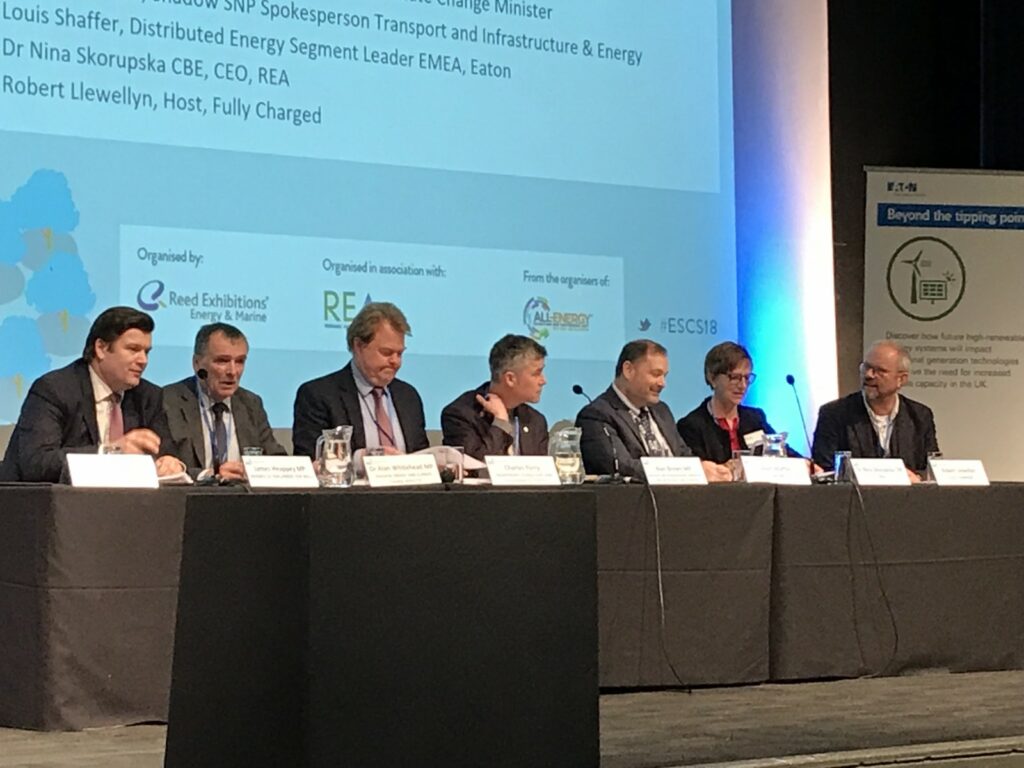Prominent politicians from across the political spectrum have warned against the UK’s departure from the Internal Energy Market (IEM) as part of Brexit, despite the country’s exit from the single market taking automatic continuation “off the table”.
Speaking this week at the Energy Storage and Connected Systems event hosted by the Renewable Energy Association (REA), parliamentarians from the Conservatives, Labour and the SNP gathered to discuss the impact of Brexit on the UK’s energy system.
James Heappey MP explained that while we would “argue passionately for the IEM”, the government’s decision to leave the single market in an effort to halt free movement of people meant that continued membership would likely not be possible in its current form.
“As I understand it, IEM membership requires single market membership and if you’re not going to be in the single market therefore we are up against it to just carry automatically membership of the IEM,” said the Conservative MP for Wells.
Referencing Labour’s position to leave the single market as a consensus across the two leading parties that this would be the case, he added: “Both of the parties that could be in government if there was a general election…are both saying we’re not going to be in the single market so automatic continuation of the IEM is off the table.”
Diverging rules to affect investment
Confirming that was Labour’s position “at the moment”, the shadow minister for energy and climate change Alan Whitehead nonetheless warned that to leave IEM could damage the future security of energy supply to the UK.
With at least 12GW of interconnectors planned with Europe, Whitehead explained that differing regulatory rules at either end could damage their ability to raise private capital.
“The IEM very much is about making sure trading arrangements and standards are brought together as much as possible…I certainly worry that if we’ve got different arrangements at either end of the interconnector in the future, that interconnector becomes fairly un-investable and one of the priorities I know that we have to go for over the next period is a significant improvement in our levels of interconnection to underpin the security of our energy system,” he said.
Nina Skorupska, chief executive of the REA who also spoke on the panel, agreed: “We have to be able to negotiate being a part of the IEM, we cannot have different rules between the UK and the rest of mainland Europe.”
The voice of Ireland
However, Heappey argued that these concerns would allow the UK to remain as close to operating within the IEM as possible, not least because of the proximity of the Republic of Ireland. The UK’s only land bordered EU neighbour is currently setting up a single energy market with Northern Ireland known as I-SEM, and already has an interconnector with the UK with plans for three more.
“I would hope that given the requirement for Irish energy security through interconnections to the UK and access to a market there that it should be reasonably straight forward to achieve a free trade agreement on energy,” he said.
“It is very, very likely – probable in fact – that we will end up with something that looks remarkably similar to where we’re at right now. It is in nobody’s interest [to change] and the voice of Dublin in the debate over the UK continuing in the IEM will be deafening because Ireland requires that very strongly indeed.”
He added that should no deal be made, the UK would not suffer financially due to the fact that the World Trade Organisation, under whose rules the UK would fall in such an situation, does not apply tariffs to electricity and gas.
The dirty man of Europe
However, other panellists warned that the UK’s exit from the IEM would have other consequences. Alan Brown, the SNP energy spokesperson claimed that it was impossible to “cherry pick” a better arrangement than that of the entire EU single market, calling it “a complete fallacy”.
He added that there was also a risk that the UK would lose sight of its environmental leadership if more affordable options became available, potentially returning to “the dirty man” of Europe.
“There’s a real risk that while the UK might attain an opportunity to lead at some point, this attitude will come back that we can do things cheaper and we can turn a blind eye. So there’s a real risk going forward and I don’t think we should be blinded to the fact that at the moment we think the UK can be a leading light because it’s not always [the case],” he said.
Finally the Committee on Climate Change chairman Lord Deben commented that to even to remain in the IEM without being a full member of the European Union would extricate the UK from any change of affecting its direction.
“What you’re doing is picking a few things that we can go on doing and removing yourself from the circumstances of influencing the whole. The real reason I get so angry about Brexit is because it is Britain saying we want to remove ourselves from the opportunity of making this world the better place because this is our big opportunity. It’s where we’ve led on climate change, moving from the dirtiest man in Europe to the cleanest man in Europe. That’s where we’ve led in international negotiations,” he said.
“Are we going to be the kind of people who more or less get by on one or two things that are so desperate that you just had to get by, or are we going to influence the future not just of ourselves and our neighbours but of the world?”
While little has been forthcoming from the UK/EU negotiations reading continued membership of the IEM, France has suggested previously its plans for future interconnection remain unaffected.





